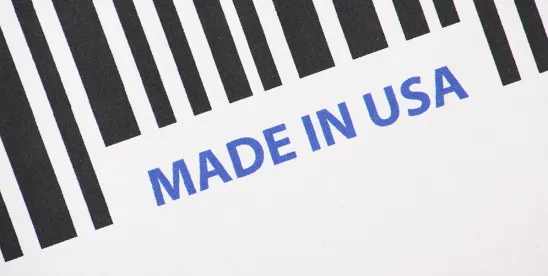The Federal Trade Commission (FTC) has continued its crackdown on false and misleading “Made in USA” claims. Since finalizing the Made in the USA Labeling Rule in 2021, which authorizes the agency to levy civil penalties against noncompliant companies, the FTC has brought 11 enforcement actions, resulting in over $15 million in judgments against parties found to have falsely labeled their products as being “Made in the USA.”
As discussed below, three clothing manufacturers — Chaucer Accessories, Bates Accessories, and Bates Retail Group — and their owner, Thomas Bates, are the most recent recipients of the FTC’s scrutiny of “Made in the USA” claims.
The Made in the USA Labeling Rule
Exercising its authority under the FTC Act, the FTC has long required products advertised as “Made in the USA” to be “all or virtually all” US-made. The Made in the USA Labeling Rule, 16 C.F.R. 323, codifies this standard, providing that it is unlawful to label or promote any product, without qualification, as “Made in the USA” unless “the final assembly or processing of the product occurs in the United States, all significant processing that goes into the product occurs in the United States, and all or virtually all ingredients or components of the product are made and sourced in the United States.” Companies that label or advertise products as being “Made in USA” without meeting this standard can be subject to civil penalties.
The FTC’s Recent Enforcement Action
The FTC recently announced a Consent Agreement with three New England-based clothing manufacturers — Chaucer Accessories, Bates Accessories, and Bates Retail Group — and their owner, Thomas Bates, to settle an enforcement action brought by the agency. The FTC alleged that the companies falsely promoted their products as being “Made in the USA.” Under the Consent Agreement, the companies and their owner agreed to pay a total of $191,481 in civil penalties.
During its investigation, the FTC found that the companies prominently advertised their products as being “Made in USA” and “Hand Crafted in the USA” on their websites, in third-party catalogs, and in online marketplaces. The agency alleged that many of the products — including belts, bags, wallets, and shoes — were, in fact, either wholly imported or contained significant imported components, meaning they failed to meet the “all or virtually all” standard. Additionally, the FTC alleged that the companies imported belt straps, affixed them with buckles in the United States, and then labeled them “Made in USA from Global Materials.” The agency determined that the “de minimus” finishing step of affixing buckles to foreign-made belt straps was insufficient to substantiate this claim.
In addition to the more than $191,000 in civil penalties mentioned above, the companies are required under the Consent Agreement to notify all consumers who purchased their products since January 2018. The notice must explain that, despite being advertised as “Made in the USA” or similar, the product purchased by the consumer did not meet the FTC’s “all or virtually all” standard.
The Takeaway
This Consent Agreement follows a series of FTC enforcement actions penalizing companies for allegedly false “Made in the USA” claims, such as Williams-Sonoma’s $3.17 million civil penalty and actions concerning DreamCloud mattresses and Pyrex-brand glass measuring cups, which we reported on in previous alerts. These actions serve as a reminder to manufacturers of the financial and reputational cost of making false, misleading, or unsubstantiated “Made in the USA” claims.
To reduce the risk of regulatory scrutiny, companies should carefully track the origins of the materials incorporated into their products and where all steps in the assembly process occur. Product labeling and advertising should then be carefully reviewed to confirm that any “Made in the USA” claims are accurate, not misleading, and substantiated. For any products that do not meet the FTC’s “all or virtually all” standard, the claim should be removed or qualified appropriately. It is also advisable for companies to take inventory of their US-origin claims and periodically review their goods to confirm that the claims remain accurate. These practices are particularly important for the fashion industry, considering the significant amount of manufacturing and materials sourcing that occurs abroad.




 />i
/>i

